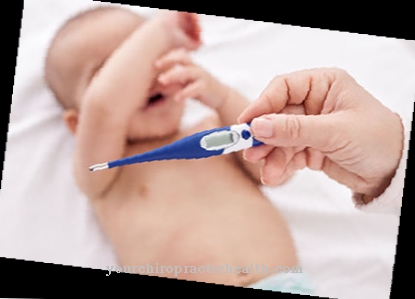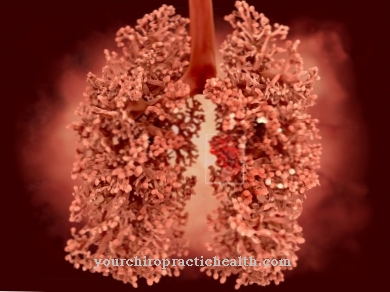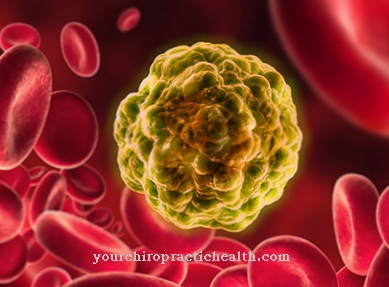To get a general overview of the subject Skin diseases The following text provides information about the causes, diagnosis and course of skin diseases as well as their treatment and prevention.
What are skin diseases?

© logo3in1 - stock.adobe.com
Under a skin disease (medical term: Dermatosis) one understands diseases of the skin and the skin appendages (nails, hair, talc and sweat glands) as a reaction to various influences and stimuli from the environment or the inside of the body.
The severity and appearance of skin diseases vary considerably. The classification of skin diseases is based on the affected body parts and surfaces. A distinction can be made between:
Generalized skin diseases: are, for example, allergic reactions of the skin, psoriasis, itching or eczema that occur on the entire surface of the skin or in several areas.
Local skin diseases: are for example skin cancer and infectious diseases, acne, hair loss, corns or skin fungus and cuts or abrasions that only occur in one place or area of the skin.
causes
As diverse as the skin diseases can be, their causes are just as extensive. They start with simple injuries such as cuts or grazes, arise from infections or disorders of the metabolism, the immune system or the skin, from allergies to skin cancer.
Several causes can also occur together as triggers. Often the disposition of humans is the cause of a skin disease such as psoriasis or neurodermatitis. The triggers can also be aggravated by stress or an unhealthy diet, i.e. an unhealthy lifestyle. For many skin diseases, however, it is still not possible to determine the exact cause.
You can find your medication here
➔ Medicines against redness and eczemaTypical & common skin diseases
- psoriasis
- Sore rose
- Neurodermatitis
- Skin cancer in the form of melanoma (black skin cancer) or spinalioma (squamous cell carcinoma)
- scabies
Symptoms, ailments & signs
Complaints with skin diseases can be both visible and noticeable for those affected. The symptoms are particularly noticeable with dry skin, even if it does not always have to change optically. People with dry skin often have a more or less intense feeling of itching, and a burning sensation can also be possible.
This is especially true if the itching is causing the skin to scratch open. Dry skin can also be seen with the naked eye: the affected areas can appear red and flaky. Skin diseases can also appear in the form of lichen, pustules, pimples or raised marks. Bleeding from the skin rarely occurs.
Such bleeding can have various causes, including completely harmless ones, for example if dry skin has been severely scratched. This is sometimes the case with severe neurodermatitis in children. But if birthmarks or other skin areas bleed for no apparent reason, this is always a warning sign of a possibly malignant skin disease.
Complaints with bleeding from skin areas should always be clarified promptly by a specialist. A fast treatment improves the prognosis significantly, especially in the case of malignancies.
Diagnosis & course
So that the treating dermatologist (dermatologist) can make a diagnosis of the skin disease, he will first ask the patient about his symptoms and possible previous illnesses. Then the skin and the affected areas are examined based on symptoms.
Common symptoms can include:
- Wheals
- stains
- Dandruff
- Cracked and dry skin
- Reddening of the skin
A diagnosis of the skin disease can often be made on the basis of the skin changes. The course of the symptoms can on the one hand be harmless, as in the case of sunburn, acne or warts, so that the symptoms go away again without or with brief treatment.
On the other hand, they can also be signs of a serious skin disease such as psoriasis or neurodermatitis. These cannot yet be completely cured and have a protracted effect on the patient.
Complications
As a rule, skin diseases can lead to various complaints and complications. For this reason, a general forecast is not possible and, as a rule, does not make sense either. However, the skin diseases always have a negative effect on the patient's quality of life. In most cases, this leads to pain, itching, or redness.
Those affected also suffer from reduced aesthetics and thus not infrequently from inferiority complexes and a reduced self-esteem. The skin diseases therefore often lead to depression. The skin appears dry and may be covered with papules. As a rule, skin diseases do not lead to death or reduce the life expectancy of the patient. They can often be treated easily so that there are no particular complications.
In the treatment, both drugs and creams and ointments are used. These soothe the skin and fight skin diseases. As a rule, good hygiene also has a positive effect on these complaints and can fundamentally minimize the risk of skin diseases. In severe cases, radiation or chemotherapy may also be necessary to cure these diseases over the long term.
When should you go to the doctor?
In the case of skin changes of any kind, it is generally advisable to consult a doctor. If the skin is reddened, flaky excessively or if the patient suffers from excruciating itching, the cause should be clarified by a dermatologist as soon as possible. In addition to the dermatologist, the family doctor can also be the first point of contact. If necessary, he or she will refer the patient to a specialist. Frequently occurring skin diseases such as acne do not necessarily require medical treatment.
However, a visit to a doctor is still recommended, especially if the symptoms are severe or persist over a longer period of time. The same applies if the skin disease is associated with great emotional stress, as is the case with neurodermatitis and psoriasis, for example.
You must be particularly quick if the skin changes affect the eye area and / or the skin is severely inflamed. Even sudden pigmentation disorders must be examined by a dermatologist in order to rule out serious diseases. In addition, a visit to the dermatologist is always essential if children are affected by skin diseases.
Doctors & therapists in your area
Treatment & Therapy
In the treatment of skin diseases, the severity of the skin disease is important. In the case of mild or harmless skin diseases, anti-inflammatory ointments, creams, pastes, solutions or lotions are usually sufficient for treatment.
Some of these ointments or creams contain cortisone and should only be used for a short period of time. The advantage, however, is the targeted application, because the active ingredient only works where it is applied. Ointments are usually not enough to cure severe skin diseases. In addition, medication (tablets or drops) must be prescribed, but these often have side effects. Antibiotics are often given for treatment.
In general, the drugs used to treat skin conditions are also called dermatics. Dermatologists in particular are familiar with their area of application. Dermatics promote wound healing by protecting, nourishing and regenerating the skin.
In addition, they also relieve the itchiness. Ointments or medication remain ineffective against the worst skin disease, skin cancer. This must be operated on and, in advanced cases, requires additional radiation or chemotherapy.
Outlook & forecast
Atopic dermatitis, intense itching occurs that cannot be removed by scratching. The skin becomes increasingly dry and rough due to the lack of sebum. Dandruff develops. Anti-inflammatory agents promise relief from the incurable neurodermatitis. Ointments and creams with a high fat content have a relieving effect on itching.
Chickenpox causes blistering all over the body. It mainly affects children. Severe itching and fever accompany the course of the disease. The highly contagious chickenpox can also affect adults, in whom the course of the disease is usually more intense. Skin changes caused by rosacea (copper rose) initially appear as a distinct reddening, usually on the face. As the disease develops, nodules and purulent pimples appear.
Shingles leads to rapid swelling of the skin, on which reddish nodules and blisters subsequently develop. Antiviral and pain reliever drugs should be taken early to prevent complications. The symptoms can then subside quickly.
Winter eczema can develop more and more as a result of cold outside temperatures, dry heating air and sweating in overheated rooms. This can lead to reddening of the skin, itching and burning. The complaints are reduced by the use of greasy, moisturizing skin products and water evaporation containers in the living rooms.
Dyshidrotic eczema (non-contagious, chronic skin disease) forms mainly on the palms of the hands. Blisters filled with edema fluid develop, which can become inflamed and are associated with itching. The disease can last for several weeks and be chronic. Cold, damp compresses and anti-inflammatory, moisturizing ointments relieve the symptoms.
You can find your medication here
➔ Medicines against redness and eczemaprevention
For skin diseases in the form of allergies, preventive measures can be taken by avoiding the triggers. E.g. sun-sensitive people avoid the sun. If you come into contact with skin-irritating substances while working, gloves should be worn. Furthermore, allergy tests can be done if the cause of a skin disease is unknown.
If necessary, so-called skin protection ointments can be bought in the pharmacy. A healthy diet should still be observed. To prevent skin cancer, you should go to regular checkups and have moles and moles examined.
Aftercare
The follow-up measures for skin diseases usually depend very much on the exact disease, so that generally no general prediction can be made. However, all skin diseases must primarily be examined and treated by a doctor so that there are no further complications or discomfort. The earlier this disease is recognized and treated by a doctor, the better the further course, which is why the person affected should consult a doctor at the first symptoms and signs.
Since some skin diseases are contagious, contact with other people should be avoided. A high standard of hygiene can also have a positive effect on the course of such diseases. In most cases, these diseases are treated with the use of creams or ointments and medication.
The person affected should ensure regular use and the correct dosage in order to permanently alleviate the symptoms. Regular checks by a doctor are very important. In most cases, the skin diseases do not have a negative impact on the life expectancy of the person affected. Contact with other patients can also be useful.
You can do that yourself
Anyone who has suffered from a skin disorder for several days that does not improve should definitely consult a doctor, preferably a dermatologist. Whether and what the patient can do to improve his or her health depends on the type of skin disease and its cause.
A widespread problem is the many forms of acne that have long since plagued teenagers. Acne sufferers should remove all comedogenic skin care products, including decorative cosmetics, from the bathroom. In pharmacies and specialist shops there are special products for acne patients that are labeled as "non-comedogenic".
In addition, regular and thorough cleaning of the affected skin areas is recommended, but this must not be done with aggressive agents. Good results for blemished skin and mild acne are achieved with cleaning products based on micelles that can be bought in drugstores.
Skin diseases that are the result of a contact allergy or food intolerance are also very common. If the allergen is not known, the person affected can find out by keeping a diary whether there is a statistical connection between the occurrence of the allergy and certain behaviors.
Under no circumstances should the affected areas of the skin be scratched, especially not with bare fingers, as otherwise there is a risk of secondary infection. Over-the-counter antihistamines from the pharmacy help against unbearable itching.
When treating neurodermatitis, care products that contain the active ingredients urea (urea) and evening primrose oil often provide an improvement.



.jpg)























